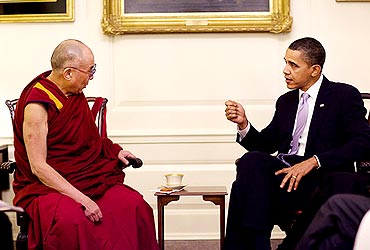The sharp reaction came a day after Obama held talks with the 74-year-old Tibetan spiritual leader at the White House, the first meeting between the two Nobel Peace Prize winners. Washington had ignored Beijing's warning that such a meeting would harm Sino-US ties.
Chinese Vice-Foreign Minister Cui Tiankai summoned US Ambassador Jon Huntsman to lodge Beijing's protest over the Obama-Dalai meeting, the statement said. The White House had carefully planned the meeting in hopes of containing Chinese protests, inviting the Tibetan leader to Maple Room, a private area in the sprawling executive mansion, rather than the Oval Office and not allowing the media and TV cameras inside. Ma said that Thursday's meeting went against repeated commitments by the US government that it recognises Tibet as part of China and does not support Tibet's independence.
Describing Tibet as an inseparable part of China and Tibet-related issues its internal affairs, Ma said Beijing is firmly opposed to any meeting with the Dalai by leaders or government officials of any country in whatever form. China is resolutely opposed to interference in its internal affairs by any person or country under the pretext of Dalai-related issues, Ma said. The statement also attacked the Dalai, saying his words and deeds have shown that he is "not purely a religious figure, but a political exile engaged in long-term anti-China splittist activities under the disguise of religion."
It said that the Chinese government and people were steadfast in their resolve to safeguard national sovereignty and territorial integrity, emphasising that any attempt to interfere in China's internal affairs under the Dalai issue is "doomed to failure".The statement demanded that the US stop "conniving (with) and supporting anti-China splittist forces" and take prompt and effective measures to remove the malign impact by taking concrete actions to maintain the healthy and stable development of China-US relations. While objecting to the meeting, China had asked the US to fully understand the high sensitivity of Tibet-related issues and honour its commitment to recognising Tibet as part of China.
China accuses the Dalai of pursuing Tibet's independence, a charged denied by him saying that he is onlyseeking greater autonomy for the remote Himalayan region.Obama met the Dalai for around 70 minutes and discussed with him Tibet and other international issues. Secretary of State Hillary Clinton also had a separate meeting with the Tibetan leader."The President commended the Dalai Lama's 'Middle Way' approach, his commitment to non-violence and his pursuit of dialogue with the Chinese government," White House Press Secretary Robert Gibbs said in a statement.
On his part, the Dalai said he was seeking a "meaningful" autonomy for Tibet and asked China to shed its one-sided approach by adopting a more "holistic view" on the issue. During the meeting, Obama also renewed his support for the preservation of Tibet's unique religious, cultural and linguistic identity and protection of human rights in Tibet.
The White House only put out a single picture of the two Nobel laureates in the meeting and issued a statement backing the Dalai Lama's goals. The Dalai, who fled his homeland for India in 1959, advocates a "Middle Way" of seeking greater rights for Tibetans while accepting Chinese rule in his Himalayan homeland. The Obama-Dalai meeting came at a time when Sino-US ties have already soured over the sale of a US $ 6.4 billion package of American weapons to Taiwan, which Beijing views as a Chinese territory to be reunified by force if necessary.
Obama had been under intense domestic pressure to meet the Dalai after putting off a meeting with the Tibetan spiritual leader in October last year, prior to his first China visit.








 © 2025
© 2025